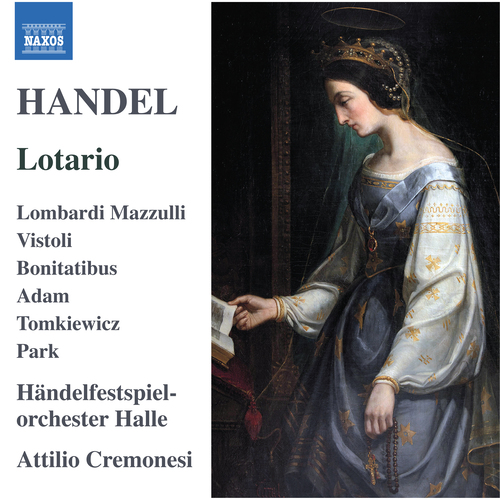HANDEL Lotario (Cremonesi)
View record and artist detailsRecord and Artist Details
Genre:
Vocal
Label: Naxos
Magazine Review Date: 02/2025
Media Format: CD or Download
Media Runtime: 157
Mastering:
DDD
Catalogue Number: 8 660570-71

Tracks:
| Composition | Artist Credit |
|---|---|
| Lotario |
George Frideric Handel, Composer
Anna Bonitatibus, Matilde, Mezzo soprano Attilio Cremonesi, Conductor Carlo Vistoli, Lotario, Countertenor Francesca Lombardi, Adelaide, Soprano Halle Opera House Handel Festival Orchestra Ki-Hyun Park, Clodomiro, Bass Krystian Adam, Berengario, Tenor Rafał Tomkiewicz, Idelberto, Countertenor |
Author: David Vickers
Lotario (December 1729) used a libretto adapted from a recent opera by Orlandini that Handel probably heard earlier that year when passing through Venice. Berengario and Matilde have murdered the king of Italy and now plot to force his widow Adelaide to marry their son Idelberto (a nice chap dismayed by his parents’ nefarious scheme). Their villainy is aided and abetted by henchman Clodomiro. However, Lotario (king of Germany) defeats and imprisons Berengario (who repents), and the hero is reunited with his beloved Adelaide.
Alan Curtis abridged Lotario heavily and at around the same time a concert performance conducted by Paul Goodwin was whittled down to a disc of arbitrary highlights (Oehms, 12/04). A live recording made at Göttingen benefited from Laurence Cummings’s expert musical direction and a capable cast who had brought their characters to life in a staged production, but it was also hampered by a few smaller cuts. This live concert recording made during the Halle Handel Festival features the resident orchestra of the city’s opera house. The booklet note is poor and, shamefully, Naxos does not provide the libretto at all in any form. I can report that a huge amount of recitative is deleted from a dozen scenes, often obscuring essential dramatic lines. One aria is omitted completely (Clodomiro’s ‘Alza al ciel pianta orgogliosa’ from Act 3 scene 9) and 10 others are truncated brutally to just their first sections or end prematurely with their middle sections, ie before the return of the first section, whether or not we are returned properly to the home key. Such ill-advised methods render musical structures irreparably lopsided and also mean that ABA poetic texts no longer make sense; some of Handel’s best music in terms of compositional ingenuity is chopped down senselessly. It is disappointing that another recording of Lotario turns out to be far from complete, despite advertising that it used the scholarly edition published by the Hallische Händel-Ausgabe.
Francesca Lombardi Mazzulli’s vivid projection of Adelaide’s feisty strength of will is at the expense of dignified virtue. On the other hand, there is sophisticated lightness in virtuoso coloratura throughout the showpiece ‘Scherza in mar la navicella’ at the close of Act 1. Carlo Vistoli strikes a convincing balance between fluency, melodiousness and technical surety; his finest moment is ‘Non disperi peregrino’, an evocation of a pilgrim unworried by nightfall at the close of Act 2. Matilde’s vengeful ‘Arma lo sguardo’, later Handel’s model for Jephtha’s ‘Open thy marble jaws’, is taken by Attilio Cremonesi as quickly as possible and Anna Bonitatibus’s intelligent singing is up to the rapid task. The tyrant Berengario’s complaint at his defeat (‘Regno e grandezza’) has reams of tricky triplets including unexpected leaps that are sung elegantly by Krystian Adam. Rafał Tomkiewicz delivers sweet limpidity and neat trills throughout Idelberto’s ‘Per salvarti, idolo mio’; his singing is momentarily fragile in ‘S’è delitto trar da’ lacci un’ innocente’ and Handel’s use of F sharp minor causes unison violins some discomfort. Ki-Hyun Park delivers bluff-hearted extroversion in Clodomiro’s ‘Se il mar promette calma’, even if the simile’s implication of calm after the storm is lost amid acrobatic thundering. Cremonesi’s direction encourages a healthy variety of affects; oboes are sometimes obscured by violins in the foreground, though there is swaggering panache in the battle sinfonia (Act 3 scene 5) – the sole appearance of a trumpet has an opening motif foreshadowing a certain bass air in Messiah.
Discover the world's largest classical music catalogue with Presto Music.

Gramophone Digital Club
- Digital Edition
- Digital Archive
- Reviews Database
- Full website access
From £8.75 / month
Subscribe
Gramophone Full Club
- Print Edition
- Digital Edition
- Digital Archive
- Reviews Database
- Full website access
From £11.00 / month
Subscribe
If you are a library, university or other organisation that would be interested in an institutional subscription to Gramophone please click here for further information.




